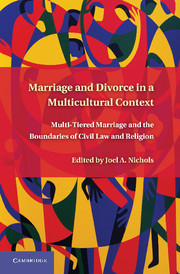 Marriage and Divorce in a Multi-Cultural Context
Marriage and Divorce in a Multi-Cultural Context Book contents
- Frontmatter
- Contents
- Detail Contents
- About the Editor
- List of Contributors
- Preface
- Permissions
- Introduction
- 1 Multi-Tiered Marriage
- 2 Pluralism and Decentralization in Marriage Regulation
- 3 Marriage and the Law
- 4 Unofficial Family Law
- 5 Covenant Marriage Laws
- 6 New York’s Regulation of Jewish Marriage
- 7 Political Liberalism, Islamic Family Law, and Family Law Pluralism
- 8 Multi-Tiered Marriages in South Africa
- 9 Ancient and Modern Boundary Crossings Between Personal Laws and Civil Law in Composite India
- 10 The Perils of Privatized Marriage
- 11 Canadian Conjugal Mosaic
- 12 Marriage Pluralism in the United States
- 13 Faith in Law? Diffusing Tensions Between Diversity and Equality
- 14 The Frontiers of Marital Pluralism
- Index
- References
11 - Canadian Conjugal Mosaic
From Multiculturalism to Multi-Conjugalism?
Published online by Cambridge University Press: 05 November 2011
- Frontmatter
- Contents
- Detail Contents
- About the Editor
- List of Contributors
- Preface
- Permissions
- Introduction
- 1 Multi-Tiered Marriage
- 2 Pluralism and Decentralization in Marriage Regulation
- 3 Marriage and the Law
- 4 Unofficial Family Law
- 5 Covenant Marriage Laws
- 6 New York’s Regulation of Jewish Marriage
- 7 Political Liberalism, Islamic Family Law, and Family Law Pluralism
- 8 Multi-Tiered Marriages in South Africa
- 9 Ancient and Modern Boundary Crossings Between Personal Laws and Civil Law in Composite India
- 10 The Perils of Privatized Marriage
- 11 Canadian Conjugal Mosaic
- 12 Marriage Pluralism in the United States
- 13 Faith in Law? Diffusing Tensions Between Diversity and Equality
- 14 The Frontiers of Marital Pluralism
- Index
- References
Summary
The “Canadian school” of social and political theory has been at the forefront of theoretical reflection on the problem of multicultural diversity. These theoretical contributions, some claim, have built on Canada’s proven political capacity to accommodate deep diversity. Canada was the first nation in the world to adopt multiculturalism as its official state policy, a landmark venture that was wedded to an equally strong commitment to the modern rights revolution. The historic 1982 constitutional act that established the Canadian Charter of Rights and Freedoms also entrenched multiculturalism, gender equality, aboriginal rights, and bilingualism – as well as reaffirming confessional educational rights of Catholics and Protestant minority communities. This is a classic Canadian constitutional mix.
How does marriage fare in this land of multiculturalism, rights, and deep diversity? Canadian couples dwell in a complex array of political intersections, cultural fissures, and ideological divides when it comes to questions of gender, sexual orientation, and conjugality. In the last decade, Canada has been at the forefront of a number of innovative developments in the domain of conjugality. After a relatively tame public debate, Canada redefined marriage to include gay and lesbian couples. Canadian courts and legislatures have been advancing our constitutional commitments to gender equality in areas of conflict between civil and religious family law. Moreover, Canadian and provincial governments have launched a public debate over the question of decriminalizing polygamy. By 2003, Canada’s growing “boldness in social matters” was earning it a “rather cool” rating from global public pundits. It remains an open question, however, whether these developments have uniformly caused gains in advancing Canadian commitments to deep diversity in the domain of conjugality.
- Type
- Chapter
- Information
- Marriage and Divorce in a Multi-Cultural ContextMulti-Tiered Marriage and the Boundaries of Civil Law and Religion, pp. 284 - 308Publisher: Cambridge University PressPrint publication year: 2011
